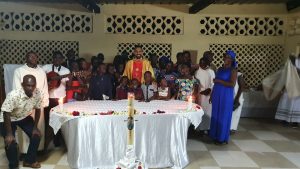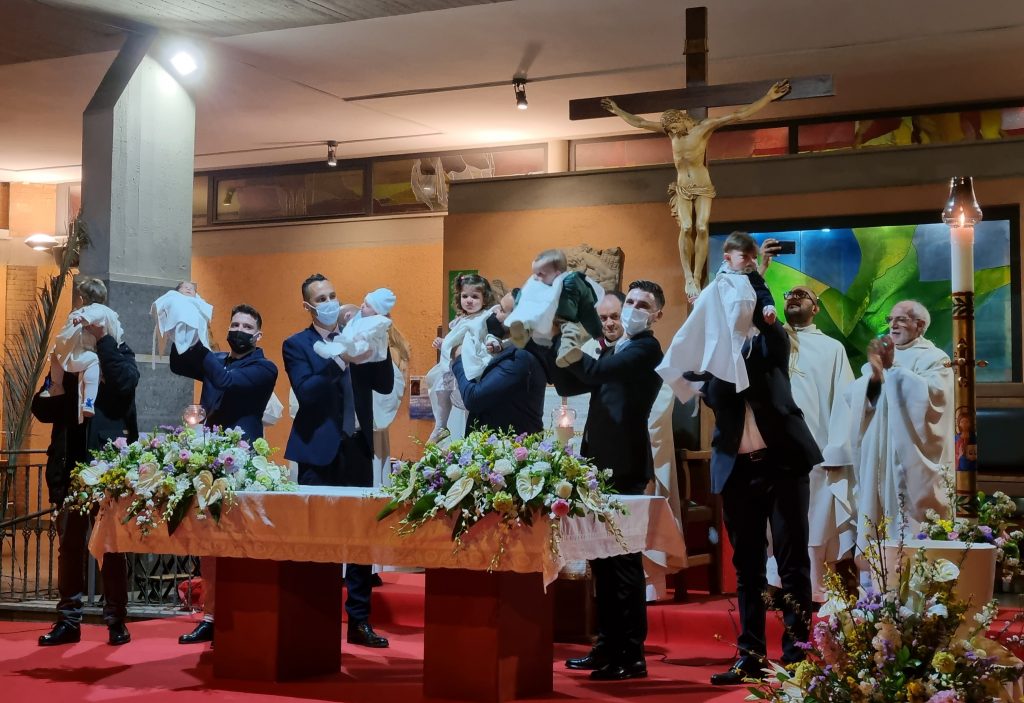Although the circumstances varied a little depending on where you live, Holy Week and Easter for American Catholics this year represented a gradual return to normality. In most cases, worshipers were able to gather following certain COVID-19 restrictions.
But what about the rest of the world?
To find out, Angelus caught up with Catholics in six parts of the world and asked them what this second “pandemic Easter” meant for them in this historical moment of worldwide suffering and uncertainty.
Bongouanou, Ivory Coast
Father Matteo Diotallevi
Infection and mortality rates are extremely low in Ivory Coast, and we were allowed to celebrate the Paschal triduum as it is usually done in this country.
The triduum is a big deal here. Almost everyone participates in the liturgies. On Good Friday there is a massive pageant in which young people reenact all the parts of Christ’s passion. The whole assembly joins in the “Via Crucis” (“Way of the Cross: path of suffering”), following Jesus around town as he is scourged by the Romans and falls multiple times on the asphalt and dirt of our roads.
On Saturday night we had the Easter Vigil. It was not possible to celebrate it in the parish, but we were hosted by a convent of nuns. They gave us a big room which is normally used as a school hall. There was not a lot of light (we needed a torchlight to read the readings), but there were many drawings by the school’s children to brighten up the walls.
The faithful came from three different cities, some as far as 100 miles away, to attend. After the vigil we had a little banquet. A woman from the parish spent a lot of money to rent tables and chairs so she could host all the vigil’s participants, and they were able to kill a lamb and feast together afterward.
Personally, this Easter was a great help for me. It was my first Easter Vigil as a priest, and I could not help thinking about last Easter. I was suffering a lot back then, not so much for the pandemic, but because I could not get along with the priest I lived with. I experienced that not being able to love another person is the greatest suffering.
And yet, this is what the resurrection of Christ came to overcome for me: This year we experienced a great sense of communion, a new spirit!
It also helped me immensely to see the joy of the people here, how they did not spare any effort to be able to participate in the liturgies, how they felt it was a privilege they would not exchange for anything. Their joy was contagious, and our vigil was truly an explosion of joy.
Originally from Rome, Father Matteo Diotallevi is a missionary priest of the Archdiocese of Abidjan in Ivory Coast.

Rome, Italy
Valentina Pietropaolo
While last Easter we had to have at-home celebrations with our families, this year the government allowed us to celebrate the triduum at our local parish.
Due to COVID restrictions, however, we weren’t able to do the rituals typical of Holy Thursday and Good Friday: the washing of the feet and the adoration of the cross.
So for Holy Thursday, my husband and I organized a little celebration at home, in which we washed our children’s feet and then we gave them the opportunity to wash one another’s feet and ask forgiveness to one another. My husband gave a little speech to the children explaining what it means for Jesus to wash our feet, and how he invites us to do the same to one another.
On Friday night, we did the same with the adoration of the cross: As we kissed the cross at home, I explained to my kids how this is a sign that we want to participate in the suffering of Christ.
The Easter Vigil was made possible by a little miracle. It was scheduled to take place outdoors, but the weather forecast predicted it would be raining. Instead of canceling it, our pastor went ahead, and was vindicated: It ended up raining in other parts of the city but not in our neighborhood!
During the vigil our pastor baptized our fourth child, who is only a month old, and it was a great joy. Every Lent seems to be a time of trial for us, and this one was no exception. By the time this Easter came around, we felt tired and burdened. But the homily by the pastor consoled us. He said that Easter means that everything is possible; with Easter, Christ defeats death and gives us a Spirit that conquers everything. This was the good news: the certainty that no matter what would happen, his Spirit would give us the strength to accept every suffering.
The situation with the pandemic here in Italy is pretty grim. We are in the middle of a “fourth wave,” and we are lagging way behind other countries in vaccinations. This Easter was a reminder that while vaccines may help end the pandemic, they cannot solve the problems of man’s heart. The triduum helped us live this time of uncertainty close to the Lord. The resurrection of Christ gave us the certainty that God will accompany us in whatever awaits us.
Santiago, Chile
Roberto Rios
Here in Chile, there was a debate leading up to Holy Week about whether the state could suspend religious gatherings due to the COVID pandemic. The country’s highest court ruled that the government could not suspend public worship for any religion, but it only allowed up to 5 people to attend in person to help with livestream.
Despite being held online, I think the celebrations were done with a very strong spirit of community, especially by how we were praying for those affected most by the coronavirus, and those who are most alone.
We have many elderly people in our parish community who have suffered a lot during this pandemic, so we have tried to accompany them as much as possible. Since Easter Sunday, the pastor has been calling to check on them, to bless them, and wish them a happy Easter. This has been received very well.
This Holy Week was a profound time of silence and greater recollection for me. This was our second Holy Week in quarantine. Last year there was a lot more fear than there was this time. I lived it with a lot more hope, and with a better sense of what the “domestic Church” means, to live the faith at home, celebrating the triduum very intensely at home with our kids, and transmitting a greater sense of community to my family — but with joy.

Geneva, Switzerland
Francesca Marconi
Being able to celebrate Easter this year was a bit of a miracle for me, my husband, and six kids. In order to be able to gather legally for this year’s vigil, we had to pass many tests. Not only did all our family have to test negative for COVID-19 beforehand, but all the tests done to all the students in our children’s classes had to come back negative.
And yet, it happened. We were able to celebrate the Paschal triduum in a small church with the other families of our “missio ad gentes” (“To the Nations”) missionary community from the Neocatechumenal Way, and all our children were with us for the all-night Easter Vigil that began Saturday night.
Personally, I was really struck by the Gospel in the Easter Vigil. The women went to anoint the body of Jesus without even knowing how to roll back the stone. But when they arrive, the problem is already solved: The tomb is empty and an angel tells them that Jesus is risen.
What does that mean for me? That God asks me to encounter situations of suffering in my life even if I don’t have the means to solve these problems myself. In other words, these situations are an opportunity to see that Jesus is risen and has conquered death.
The third reading in the Easter Vigil (the Exodus account of the opening of the Red Sea) seemed to say the same thing: God only asks his people to set out on a journey, but he takes care of the rest.
He opens up the sea, blocks the chariots of the Egyptians, and so on. All the people of Israel have to do is walk. This was the good news for me.
This, for me, was the hope of Easter: Death is conquered and you can endure suffering in peace. It is not easy being an immigrant family here, having six kids with all their needs and sufferings, but Easter offers me a new spirit to endure any suffering with Christ-like peace.
Kaohsiung, Taiwan
Tamara Perez
Since the pandemic is largely under control here in Taiwan, things have gone back to pre-pandemic normal. That’s what made being able to gather again for Easter this year so beautiful. Last year, we were all stuck in our homes, doing domestic celebrations. This year felt like a new beginning, and it filled us with gratitude.
Personally, I was struck by the first reading during the Easter Vigil. I have never noticed a detail in the account of Abraham’s sacrifice of Isaac, that it took him three days to get to Mount Moriah. What three days of anguish and pain they must have been, what horror to be knowing where he was going and what he had to do! And yet the Lord answered him. This great suffering Abraham had later found its meaning.
This helped me very much; to think that every suffering has a meaning. Thanks to this word, I am experiencing the whole of Easter as a time of rest.
Seoul, South Korea
Jesus Caletrio
Due to Korea’s strict COVID-19 restrictions, we had not been all together in one place with the families from our missionary community since the start of the pandemic more than a year ago.
For Holy Thursday and Good Friday, our pastor came to our home to celebrate with us.
My wife and I are originally from Spain, so one thing that surprised us was how well the Catholic school run by nuns here prepared our children for Holy Week. They even organized a COVID-safe washing of the feet on Holy Thursday. They did a better job of educating kids here about Easter here in Korea than they do in Spain, a traditionally Catholic country.
This Easter, in spite of all the difficulties with this pandemic, learning a totally new language, and adapting to living in a new country, I experienced this Easter how God really does take care of everything, just as he did for Abraham and Moses in the 2nd and 3rd readings of the Easter Vigil. This impressed me a lot
Experiences were compiled and edited by Angelus contributors Stefano Rebeggiani and Inés San Martín, and Editor-in-Chief Pablo Kay.

